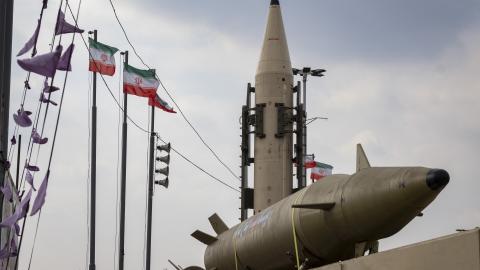Over the past 30 years, under Pakistan’s laws criminalizing blasphemy against Islam, hundreds of Christians, Ahmadis, Hindus, Sikhs, and unorthodox and reformist Muslims have been tried and imprisoned by the state or killed by extremists. But even against this brutal background, the blasphemy-triggered January 4 assassination of Punjab governor Salman Taseer by one of his elite security detail may prove a defining moment.
Taseer was head of Pakistan’s most populous and prosperous state and a close friend of President Zardari. Most pertinent, he was a voice of Muslim moderation, arguably the most powerful one in the nation, who worked for a free society and defended the rights of non-Muslims and dissident Muslims. He had recently publicly supported a pardon for Asia Bibi, a Christian mother of five sentenced to death for blasphemy, and the repeal of the blasphemy laws themselves. In the closed circle of radical discourse, because he criticized those laws, he was himself labeled a blasphemer and killed.
The laws were introduced by General Zia ul-Haq after he took power in a coup in 1977, as an attempt to gain legitimacy by posing as a defender of Islam. Vaguely aimed at those who would insult Islam, the laws have led to horrific communal violence and have been applied against an ever expanding range of victims. This is why Taseer repeatedly called blasphemy legislation a “black law” and believed it was pivotal in determining the country’s future.
While most of those accused of blasphemy in Pakistan are Muslims, non-Muslim religious minorities suffer disproportionately: Though 5 percent of the population, they are half of those accused, and the testimony of one Muslim is sufficient to convict a non-Muslim. They also suffer increasing attacks by extremists. On August 1, 2009, after a Christian was accused of burning a Koran, a mob connected to the Taliban-linked Sipah-e-Sahaba attacked Christians in Korian and Gojra: They indiscriminately killed seven Christians, six of whom (including two children) were burned alive. The Human Rights Commission of Pakistan reported that police knew of the intended attack but did nothing to prevent it. And while the government has so far not executed those convicted of blasphemy, dozens of accused people have been assassinated by fanatics, even when their cases ended in acquittal.
Two of the five blasphemy laws are specifically aimed at the 3-million-member Ahmadi community, founded in 1889 by Hadhrat Mirza Ghulam Ahmad in Qadian, now in India. Most Muslims reject Ghulam Ahmad’s teachings and believe that, contrary to Islam, he claimed to be a prophet. Although Ahmadis consider themselves Muslims, they may be imprisoned for three years if they call themselves Muslims or their meeting places mosques. They are singled out for special vilification in Pakistan’s constitution and, to receive a Pakistani passport, a Muslim must declare “I consider Mirza Ghulam Ahmad Quadiani to be an imposter Nabi [prophet] and also consider his followers whether belonging to the Lahori or Quadiani group, to be NON-MUSLIMS.” On May 28, 2010, gunmen attacked two Ahmadi houses of worship and killed 93 people attending Friday prayers.
The atmosphere stoked by the laws also contributes to violence between Sunni and Shia, as extremists castigate the others as blasphemers. There are also attacks on Sufi shrines. On July 1, three bombers killed 45 people and left 175 wounded at the Data Darbar shrine commemorating the 10th-century Sufi Data Ganj Baksh. On October 25, bombs at a shrine in Pakpattan killed six people and left 15 injured. There is also now pressure for Ismaili Muslims, followers of the Aga Khan, to be declared non-Muslim, like the Ahmadis.
Muslim reformers are also targeted. After medical professor Mohammad Younas Shaikh, a member of Pakistan’s Human Rights Commission, raised questions about Pakistan’s policies in Kashmir, he was charged with having blasphemed in one of his classes. In 2001, he was sentenced to death. After two years in prison he was acquitted on retrial but had to flee the country to save his life. In 2007, Karachi’s Anti-Terrorism Court sentenced author Younus Sheikh to life imprisonment. The judge ruled that one of Sheikh’s books had denied the validity of Rajam, an Islamic punishment of stoning for adultery.
Now charges of blasphemy are increasingly used to attack reforming politicians. Shahbaz Bhatti, the minister for minorities, and a Christian, has been accused of blasphemy and receives regular death threats for criticizing the laws, as does Sherry Rehman, a liberal legislator, for moving a bill to amend them.
There has been little public sympathy for Taseer, but there has been an outpouring of support for his killer, Malik Mumtaz Qadri. Posters of a defiant-looking Qadri are appearing in public spaces and on Islamist websites. Pakistan’s Deobandi, Wahhabi, and other extremist groups praise the assassin. He has even been lauded by 500 scholars of the relatively moderate Barelvi sect of Islam and by younger members of the pro-democracy lawyers association. Meanwhile, no lawyer is willing to take on the prosecution. Those who mourn Taseer are alleged to be insulting Islam, as was Pope Benedict XVI when he petitioned last week for the law’s repeal.
Taseer’s assassination comes amid debates in Pakistani political circles on blasphemy law reform and Islamization. On December 19, the Council of Islamic Ideology, Pakistan’s senior constitutional advisory body on Islamic injunctions, recommended some procedural changes in blasphemy laws but opposed repeal. On December 24, Pakistan’s religious parties (including the Jamiat Ulema-e-Islam-Fazal ur Rehman, which recently left Zardari’s coalition government) held protest rallies against any attempts to change them. Even Prime Minister Yousuf Raza Gilani, who avoided Taseer’s funeral, says he will keep the laws “undiluted.”
Pakistan was conceived by its founding father Mohammad Jinnah as a secular state for Muslims. But since the 1970s, successive governments have given way to increased Islamization. Now, as Islamist violence threatens Pakistan’s stability and targets the ruling elite, the revolution is eating its children.
The United States has many security concerns in Pakistan, including nuclear weapons, operations in tribal areas, and ISI support for the Taliban, but addresses blasphemy laws merely as a humanitarian matter. Taseer’s killing, however, shows that they have vital security implications: They are a key mechanism in entrenching radicalism and silencing those within Pakistani society who seek peaceful coexistence and religious moderation. As Taseer’s daughter Sara observed, “This is a message to every liberal to shut up or be shot.”















